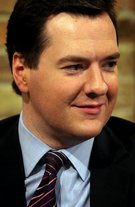 Fresh from winning GQ’s Politician of the Year award last week, George Osborne now has an accolade he may be even happier with: heavy praise from both Peter Oborne and Matthew Parris. Both commentators write columns today which dish out the superlatives for Osborne’s response to the fiscal crisis, and suggest he has been vindicated by events. Here’s the key passage from Oborne’s article, by way of a taster:
Fresh from winning GQ’s Politician of the Year award last week, George Osborne now has an accolade he may be even happier with: heavy praise from both Peter Oborne and Matthew Parris. Both commentators write columns today which dish out the superlatives for Osborne’s response to the fiscal crisis, and suggest he has been vindicated by events. Here’s the key passage from Oborne’s article, by way of a taster:
“Slowly Osborne began to win the argument.
First (as I revealed in this column last March), Bank of England governor Mervyn King sent private warnings to the Treasury that he feared extra public spending would damage the official credit ratings that are awarded to the Government as an independent yardstick of the health of the nation’s finances.
Then Alistair Darling finally woke up to the urgent need for financial restraint.
The Chancellor tried to raise the issue with the Prime Minister, but he refused to listen.
In despair, he went to Peter Mandelson, who was able to make a very reluctant Brown finally see sense and admit last week that George Osborne and David Cameron had been right all along.
Now Nick Clegg has also been forced to change tack. The Lib Dems are no longer denouncing Osborne for calling for cuts.
Instead, they are trying, very belatedly, to jump on the Osborne bandwagon by setting out their own economy drive.
The first point to note is that, for Osborne personally, this is a simply massive achievement. Remember that traditionally most opposition politicians try to play safe and conform to establishment wisdom.
But Osborne had the vision and courage to try to shape the political weather – and has succeeded magnificently.
Until now, his position has been a little vulnerable, open to the charge that he is essentially a backroom operator prone to juvenile errors of judgment such as his misbegotten meeting last year on a yacht off Corfu with Oleg Deripaska, the controversial billionaire Russian oligarch with disturbing links to Peter Mandelson.
All that can now be set aside.”
To some extent, Oborne and Parris are right: Osborne’s and the Tories’ once lonely emphasis on debt-reduction has now become a near consensus issue. And it’s hard to look back on, say, Osborne’s reponse to the Pre-Budget Report last year without some degree of admiration. There’s certainly less grumbling in Tory circles about the shadow chancellor than there was a year ago.
But any praise for Osborne should come with a couple of caveats: one backwards-looking and one forwards-looking. First, it should be noted that the Tories were themselves extremely hesitant to talk about cuts until Andrew Lansley gaffed by suggesting that 10 percent cuts were official Tory policy. And, second, the Tories are still unclear about how they will reduce Brown’s debt mountain – for all the advances that Osborne has made recently, the job isn’t yet even one tenth complete.
On the second caveat, the word is that the Tories are preparing a selection of radical and far-ranging cuts in time for the next election. If that’s the case, then there may be more praise for Osborne to come.






Comments